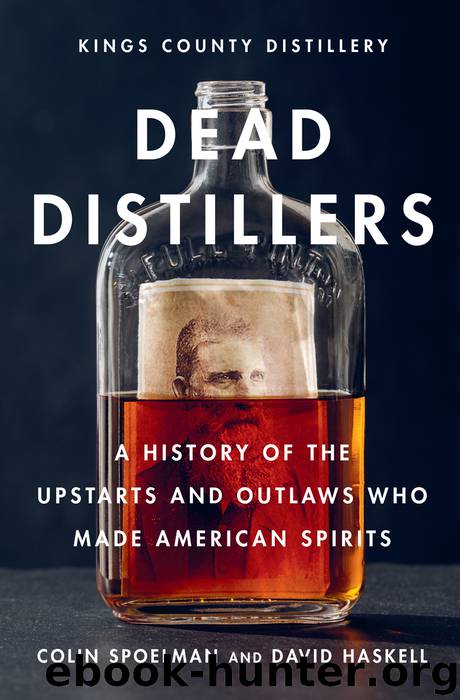Dead Distillers by Colin Spoelman

Author:Colin Spoelman
Language: eng
Format: epub, mobi
Publisher: Abrams
Published: 2016-04-07T16:00:00+00:00
An eight-story aging warehouse at an unknown distillery
PAUL JONES
WHISKEY BROKER
1841–1895
Cave Hill Cemetery, Louisville, Kentucky
Paul Jones at least carries this distinction: He has the largest tomb of any of the distillers buried in Kentucky. He died a millionaire, which was no small feat in 1895, and his wealth came from whiskey. He created many brands, the most enduring of which is Four Roses.
Born in Lynchburg, Virginia, he fled with his family during the Civil War to Georgia. He and his brother Warner joined the Confederate Army, though Paul’s “delicate health” prevented him from seeing much action. His brother died at the Battle of Atlanta.
After the war, Jones and his father sold whiskey and tobacco in Atlanta, and when the Georgia state legislature started yielding to temperance advocates, Jones moved north to Louisville, setting up in a wood-paneled office with mosaic tile floor. His business acumen was chiefly in marketing. His savvy was summarized in his obituary in the Louisville Courier-Journal by mention of his electric advertisement in Madison Square in New York that cost twelve hundred dollars a month.
Jones died a bachelor, which proves somewhat problematic for his lasting legacy, as the brand he founded is lately built on the myth that he married his sweetheart after she wore a corsage of four roses, signaling her acceptance of his proposal. Historian Mike Veach has speculated that the famous whiskey may simply have been a blend of four whiskeys from the R. M. Rose Company of Atlanta, Georgia, which sold several varieties of corn and rye whiskey using “Old-Fashioned Copper” stills. In fact, the first time the brand name appears is in an 1889 advertisement in the Atlanta Journal-Constitution. And the corsage story was once told in reverse: Jones’s beloved spurned him, so he devoted his life to whiskey. The Four Roses distillery that is today in Lawrenceburg, Kentucky, was built fifteen years after Jones’s death, and Jones was more a whiskey wholesaler and marketer than he was a distiller.
Jones had a penchant for fast horses, and, according to the Courier-Journal, “refused to let anyone pass him on the road.” At the time of his death, he owned five fast trotters, though none should be confused with the horse Paul Jones that won the Kentucky Derby in 1920.
Download
This site does not store any files on its server. We only index and link to content provided by other sites. Please contact the content providers to delete copyright contents if any and email us, we'll remove relevant links or contents immediately.
| Buying Guides | Cellars |
| Champagne | Collecting |
| Spirits | Whiskey |
| Wine | Wine Pairing |
| Wine Tasting |
Whiskies (Collins Gem) by dominic roskrow(42207)
101 Whiskies to Try Before You Die by Ian Buxton(42175)
Whiskies Galore by Ian Buxton(40327)
Craft Beer for the Homebrewer by Michael Agnew(17445)
Right Here, Right Now by Georgia Beers(3497)
Not a Diet Book by James Smith(2724)
Water by Ian Miller(2581)
The Coffee Dictionary by Maxwell Colonna-Dashwood(2530)
Kitchen confidential by Anthony Bourdain(2306)
Coffee for One by KJ Fallon(2007)
Smuggler's Cove: Exotic Cocktails, Rum, and the Cult of Tiki by Martin Cate & Rebecca Cate(1979)
Beer is proof God loves us by Charles W. Bamforth(1919)
Superfood Smoothie Bowls: Delicious, Satisfying, Protein-Packed Blends that Boost Energy and Burn Fat by Chace Daniella(1901)
Talking as Fast as I Can by Lauren Graham(1829)
Bourbon: A Savor the South Cookbook by Kathleen Purvis(1790)
A Short History of Drunkenness by Forsyth Mark(1717)
Eat With Intention by Cassandra Bodzak(1687)
Cocktails for the Holidays by Editors of Imbibe magazine(1624)
Colombia Travel Guide by Lonely Planet(1609)
